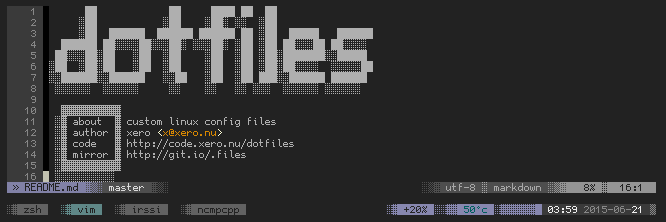blog.x-e.ro / git: page 1 of 3
 in the unix world programs are commonly configured in two different ways, via shell arguments or text based configuration files. programs with many options like text editors are configured on a per-user basis with files in your home directory ~. in unix like operating systems any file or directory name that starts with a period or full stop character is considered hidden, and in a default view will not be displayed. thus the name dotfiles.
in the unix world programs are commonly configured in two different ways, via shell arguments or text based configuration files. programs with many options like text editors are configured on a per-user basis with files in your home directory ~. in unix like operating systems any file or directory name that starts with a period or full stop character is considered hidden, and in a default view will not be displayed. thus the name dotfiles.
it's been said of every console user:
you are your dotfiles
ok, i said that ;P
since they dictate how your system will look and function.
i manage mine with gnu stow, a free, portable, lightweight symlink farm manager. this allows me to keep a versioned directory of all my config files that are virtually linked into place via a single command....
linux :: running github's open source text editor
update: this post is outdated & atom sux

atom is a "hackable text editor for the 21st century" created by the team at github. it's designed to be customizable, but also usable without needing to edit a config file.
because we spend most of our day in a text editor, the single most important feature we wanted in an editor was extensibility. atom is built with the same open source technologies used by modern web browsers. at the core of atom is chromium, the open source project behind google chrome. with that comes all the power and innovation being developed for the web. but more importantly, extending atom is as simple as writing javascript and css, two languages used by millions of developers each day.
atom.io
code :: source code management with git

git is a distributed revision control and source code management (SCM) system with an emphasis on speed. git was designed by linus torvalds, of linux fame, for managing the development of the kernel. every git working directory is a fully fledged repository, complete with revision tracking abilities independent of a network or centralized server. git is 100% open-source, freeware, and distributed under the GNU general public license v2.
 in the unix world programs are commonly configured in two different ways, via shell arguments or text based configuration files. programs with many options like text editors are configured on a per-user basis with files in your home directory ~. in unix like operating systems any file or directory name that starts with a period or full stop character is considered hidden, and in a default view will not be displayed. thus the name dotfiles.
in the unix world programs are commonly configured in two different ways, via shell arguments or text based configuration files. programs with many options like text editors are configured on a per-user basis with files in your home directory ~. in unix like operating systems any file or directory name that starts with a period or full stop character is considered hidden, and in a default view will not be displayed. thus the name dotfiles.

